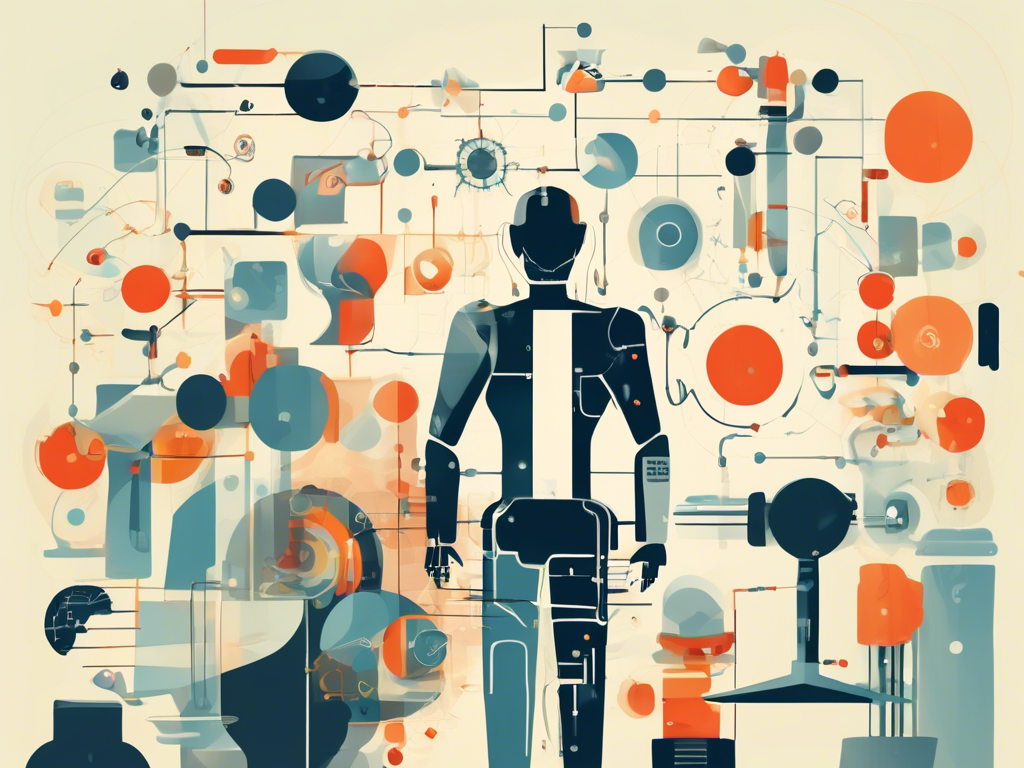In a world where technological advancements are increasingly propelled by Artificial Intelligence (AI), we stand at the cusp of a new era where the boundaries of what is possible are constantly being redefined. AI’s revolutionary impact has permeated across industries, dramatically transforming the way businesses operate and innovate. From self-driving vehicles to personalized medicine, AI’s tentacles have extended into virtually every field imaginable.
But what exactly is AI, and how has it evolved from basic algorithms to advanced real-world applications that have become indispensable in our daily lives? The journey of AI from its nascent stage to becoming a core facet of the modern world is nothing short of remarkable. As it becomes more sophisticated, the ethical implications and responsibilities surrounding AI development have sparked intense debate, compelling us to critically examine the technology’s influence on society.
AI is no longer just a futuristic concept; it has become an integral part of our everyday life, shaping our future in profound ways. Moreover, AI innovations continue to reshape the future of work, posing significant questions about the evolution of job markets and employment landscapes. This article delves deep into the heart of AI’s omnipresence, dissecting its effects and contemplating its trajectory, thereby serving as a compass to understand and navigate the complex yet exhilarating AI-driven world that lies ahead.
Exploring the Revolutionary Impact of AI Across Industries

Transforming Healthcare with AI
The healthcare industry has witnessed a seismic shift thanks to the integration of Artificial Intelligence (AI). From predictive analytics that forecast outbreaks and diseases to AI-powered diagnostics that can detect conditions like cancer more accurately than ever before, the advancements are groundbreaking. One of the most notable applications is in personalized medicine, where AI algorithms analyze patient data to tailor treatments specifically to an individual’s genetic makeup, improving outcomes significantly. Moreover, AI-driven robotics are assisting in surgeries, providing precision that surpasses human capabilities and minimizing recovery times. These innovations not only enhance patient care but also streamline operations, reducing costs and increasing efficiency within healthcare systems.
Revolutionizing the Financial Sector
In the financial sector, AI is redefining how businesses and consumers manage money. One of the key innovations is the development of sophisticated AI algorithms for fraud detection. By analyzing patterns in large datasets, these systems can identify suspicious activities with unparalleled accuracy, safeguarding against financial crimes more effectively than traditional methods. Furthermore, AI is at the forefront of automating customer service through intelligent chatbots and virtual assistants, improving user experience while reducing operational costs. Beyond customer interaction, AI’s predictive capabilities are transforming investment strategies. By processing vast amounts of market data, AI can forecast trends and provide insights that empower investors to make informed decisions. Consequently, the financial industry is becoming more secure, efficient, and customer-centric, thanks to the revolutionary impact of AI.
Understanding AI: From Basics to Advanced Real-World Applications
The Fundamentals of Artificial Intelligence
At its core, Artificial Intelligence (AI) is a branch of computer science that aims to create machines capable of intelligent behavior. The fundamental goal of AI is to develop algorithms that allow computers to perform tasks that typically require human intelligence, such as understanding natural language, recognizing patterns, solving complex problems, and learning from experience. Key components of AI include Machine Learning (ML), where algorithms improve through experience, and Deep Learning, a subset of ML based on artificial neural networks that mimic the way humans learn. These technologies form the backbone of AI’s capabilities, powering applications ranging from simple tasks like spam filtering to more complex systems such as autonomous vehicles. Understanding these basics is crucial for grasping how AI can be applied to solve real-world problems, transform industries, and impact our daily lives.
Advanced Applications of AI in Everyday Life
As AI technology progresses, its applications have become increasingly sophisticated, touching virtually every aspect of modern life. Smart home devices use AI to learn from users’ behaviors, optimizing energy use and enhancing security. In the realm of entertainment, AI algorithms recommend movies and music based on individual preferences, creating a personalized media experience. Furthermore, retail companies leverage AI for inventory management and to offer tailored shopping experiences, significantly improving customer satisfaction and operational efficiency. Another revolutionary application is in autonomous vehicles, where AI interprets sensory data to navigate safely and efficiently, promising to redefine transportation. These examples illustrate the breadth of AI’s applications, demonstrating its role as a transformative force across diverse sectors. By understanding both the fundamentals and advanced applications of AI, we can better appreciate its potential to shape the future, making our lives more convenient, efficient, and connected.
Artificial Intelligence in the Modern World

The Ethical Implications of AI Technology
As Artificial Intelligence (AI) continues to evolve and become more integrated into various aspects of society, it raises significant ethical implications that must be carefully considered. One of the primary concerns is the potential for AI technologies to infringe on privacy rights. With AI systems capable of analyzing vast amounts of personal data, there is a risk that this information could be misused, leading to violations of individual privacy. Furthermore, as AI algorithms are designed and trained by humans, they can inadvertently reflect human biases, resulting in discriminatory outcomes across race, gender, or socioeconomic status. This highlights the need for ethical frameworks that ensure AI technologies promote fairness and equity. Additionally, the increasing automation driven by AI raises questions about the future of employment and the potential displacement of workers. Addressing these ethical implications requires transparent development processes, inclusive dialogue among stakeholders, and adherence to principles that prioritize human dignity and well-being.
Responsibilities in AI Development
In response to the ethical challenges presented by AI, developers and companies have a crucial responsibility to ensure that AI systems are designed and deployed in a manner that respects human rights and promotes social good. This includes implementing ethical guidelines for AI development that address issues such as transparency, accountability, and fairness. Developers should strive to create AI technologies that are not only effective but also understandable to non-experts, allowing for greater public scrutiny and trust. Moreover, it is essential to include diverse perspectives in the design process to mitigate the risk of bias and ensure that AI applications serve the needs of a broad range of communities. Companies should also prioritize the development of mechanisms for ethical oversight, such as independent review boards that evaluate AI projects for potential ethical concerns. By taking these responsibilities seriously, developers and companies can contribute to the development of AI technologies that enhance society while safeguarding against potential harms.
AI in Everyday Life: How It’s Shaping Our Future
Personalized Experiences and Convenience
In the realm of personal technology, Artificial Intelligence (AI) has become an invisible but integral part of our daily experiences. From the smart assistants on our phones to the personalized content recommendations on streaming services, AI is at the heart of these personalized and convenient interactions. These technologies leverage user data to understand preferences and habits, thereby curating content, suggesting products, or even optimizing routes in real-time to suit our individual needs better. This not only enhances user satisfaction but also significantly streamlines our day-to-day activities, making technology more intuitive and efficient. The impact extends to e-commerce, where AI-driven algorithms offer a tailored shopping experience, displaying products you’re more likely to purchase, based on past behavior and preferences.
—
Enhancing Safety and Security
Safety and security have seen significant enhancements thanks to the integration of AI technologies. In public safety, AI-powered surveillance systems are employed to analyze video feeds in real-time, identifying potential threats and anomalies more swiftly and accurately than human operators could. This application of AI can significantly augment the capabilities of security personnel, leading to safer public spaces. Similarly, in the digital realm, cybersecurity solutions powered by AI are becoming increasingly vital. They proactively monitor and defend against sophisticated cyber threats by learning from previous attacks and predicting future vulnerabilities. This continuous learning and adaptability aspect of AI are critical in combating evolving cybersecurity challenges, safeguarding personal, corporate, and governmental digital assets against breaches and unauthorized access. These developments in enhancing both physical and digital security landscapes highlight the substantial role of AI in shaping a safer future.
The Future of Work: AI Innovations and Their Influence on Job Markets

Reshaping Industries with AI Automation
As Artificial Intelligence (AI) continues to evolve, its capability to automate complex tasks is significantly reshaping various industries. The advent of AI-driven automation is transforming traditional job roles, leading to efficiencies never before seen. In manufacturing, robots equipped with AI can perform intricate assembly work with precision and speed, reducing the need for human labor in repetitive tasks. This shift promises to increase production rates while decreasing manufacturing errors, yet it also raises concerns about job displacement. Similarly, in the service sector, AI applications like chatbots and virtual assistants are handling customer service inquiries, which were traditionally managed by humans. While these developments enhance operational efficiency and potentially open up new opportunities for human workers to undertake more creative and strategic roles, the transition requires significant workforce re-skilling and adaptability. The impact of AI automation on the job market is dual-faceted, necessitating a balanced approach that fosters innovation and supports workers through change.
Catalyzing New Job Creation and Evolution
Despite concerns about job displacement, AI innovations also play a pivotal role in creating new job opportunities and evolving existing ones. The demand for AI specialists and data scientists is skyrocketing as businesses seek to leverage AI technologies to gain a competitive edge. This trend highlights a shift toward more knowledge-intensive roles that require continuous learning and adaptation to technological advancements. Furthermore, AI is catalyzing the evolution of traditional job roles; for example, digital marketing professionals now rely on AI-powered tools for data analysis and personalized campaign strategies, enhancing their effectiveness and efficiency. Additionally, the rise of AI is fostering entirely new industries, such as autonomous vehicle maintenance and AI ethics consultancy, further illustrating AI’s potential to generate employment in unforeseen areas. By embracing AI, individuals and organizations can unlock a wealth of opportunities for job creation and career development, underscoring the importance of investing in skills training and education in the age of AI.
Summing up
As we have explored through this discourse, the integration of Artificial Intelligence into the fabric of modern society is both an extraordinary achievement and a challenging frontier. AI’s pervasive role in shaping industries, enhancing productivity, and forging new paths for innovation is undeniable. The detailed examination of AI from its fundamental concepts to the sophisticated applications in our daily lives has illuminated the vast spectrum of its capabilities and potential.
The discourse on the ethical implications and the responsibilities inherent in AI’s progression reminds us of the need for mindful stewardship of this potent technology. As AI continues to mold the contours of our existence, its repercussions on the job market and employment require proactive adjustment and forward-thinking strategies to ensure a future where technology and humanity coalesce synergistically.
In conclusion, the age of AI is upon us, influencing every aspect of life with unprecedented speed and scope. The broader implications of these insights invoke a call to action for innovators, policymakers, and individuals alike to embrace the AI revolution with both enthusiasm and prudence. It is our collective responsibility to shape the narrative of AI in a manner that benefits all sections of society while safeguarding ethical standards. Thus, let us step forth into this brave new world, armed with knowledge, foresight, and an unwavering commitment to steer the AI odyssey towards a horizon brimming with promise and inclusivity.
